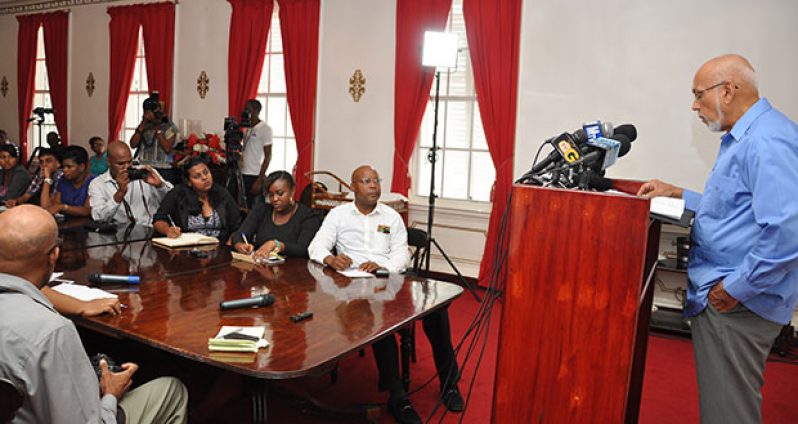THE prorogation of Parliament into April 2015 could affect that year’s budget, but President Donald Ramotar is confident that there are provisions which allow his Administration to spend from public funds.
“In all of these circumstances the constitution… and the laws of our country provide how spending of public funds are done within this period of time,” President Ramotar told reporters yesterday during a press conference on the prorogation of the 10th Parliament at State House.
“Parliament is prorogued,” he continued, adding that there are currently no special laws in Guyana which govern spending during prorogation. The President suggested that the Government must then “spend within the budget” of the previous fiscal year.
Asked to specify what laws allow the Government to access public funds even when the National Assembly has not approved, the President responded: “There are a whole body of laws that governs Government spending if elections are called.”
It is unclear what specific laws the President was referring to. However, Article 220 paragraph 3 of the Constitution speaks to the ability of the Government, through the finance minister, to spend if Parliament is dissolved.
President Ramotar has not dissolved Parliament, but his doing so would not only trigger elections but would activate the provisions of Article 220 paragraph 3, which states that if Parliament is dissolved before any actions are taken to authorise monies from public funds, “the minister responsible for finance may authorise the withdrawal of such sums from the Consolidated fund.”
The minister must however prove that monies taken from the Consolidated Fund are used for the purpose “of meeting expenditure on the public services.” The Consolidated Fund in normal circumstances could be accessed only by support from the National Assembly.
The procedure follows that after the new Parliament meets, a statement must be presented to the National Assembly by the finance minister or any other minister who was identified by the President. “When the statement has been approved by the Assembly, that expenditure shall be included, under the appropriate heads, in the next Appropriation Bill,” the legislation also read.
By his own admission, President Ramotar has made numerous attempts to engage the Opposition for dialogue, but the A Partnership for National Unity (APNU) and the Alliance For Change (AFC) both maintained that no dialogue will be had until Parliament is reconvened.
Carl Greenidge, APNU’s Shadow Minister of Finance, speaking to this publication some time ago on the options available to the Government for consideration of budgetary estimates for 2015, had stated that in normal circumstances, “You would expect them to convene” a sitting of the National Assembly to consider the financial estimates; but he lamented, “You have a Government that feels it can do whatever it likes regarding budget and other matters.”
Asked whether the Opposition would respond to a call by the President for a sitting of the National Assembly to consider budgetary estimates during a six-month prorogation, Greenidge had responded that while he could not speak on behalf of the Opposition, “my advice to them will be to ignore such a call.”
Greenidge stressed too that there was a need for the Government to recognise the Opposition’s majority in the National Assembly, so: “If it (Gov’t) wants a majority of MPs to vote for something, it has to speak to them properly.”



.jpg)








